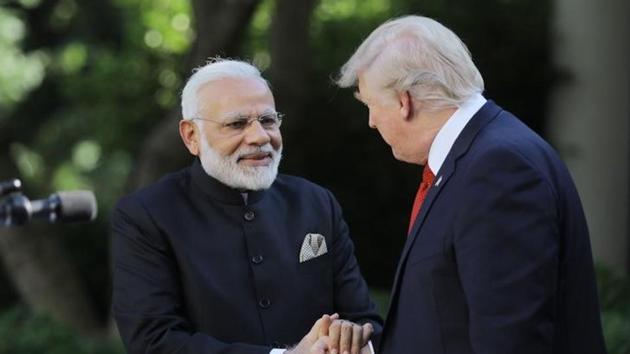Trump’s stand on the Paris climate deal may help India
Trump’s belligerence towards the Paris accords may ironically become its undoing: By highlighting coal and gas, the US president has turned attention on the need for traditional sources.
The Modi-Trump summit offers an opportunity to place in context President Donald Trump’s outburst against India earlier this month, as he announced the decision of the US to step away from the Paris climate agreement. If Trump then alleged that India was making its climate pledges conditional on international funding, the India-US joint statement this week strikes a more sobering note, calling for a “rational approach that balances environment and … energy security needs.”

Both leaders may have succeeded in moving past this moment of bilateral friction but the Paris proposal from the developed world to India was, and remains, simple and stark. First, India would have to create a unique development pathway that lifts its millions out of poverty, without the freedom of careless consumption of fossil fuels. Second, it would have to discover this new pathway by itself. And, finally, despite its self-financed attempt at balancing poverty eradication and climate responsibility, India would be judged and monitored, every inch of the way.
In the past India has been accused of being an intransigent climate negotiator. Under Prime Minister Modi, however, India decided to change its climate narrative. Modi positioned India as a country willing to lead in creating a green model that could then be exported to the rest of the world. It helped, of course, that India had already begun its transformation. Eight months before the Paris Agreement, India had already installed 77 GW of renewable energy capacity. At the time, the average Indian, as a relative share of her/his expenditure, spent about 2.5 times more than the average American on renewables. By 2022, India aims to expand its renewable energy capacity to 175 GW and will soon have built up the equivalent of German renewable energy capacity, despite having a size of economy a third smaller than Germany.
This transformation underway in India is accompanied by attitudes and decisions in the EU and the US that border on an imperialistic approach to monopolise all available carbon space. With a distinctly condescending tone, developing nations are told by their richer counterparts that demands for “sustainability” are premised on ethics and morality, discovered belatedly by the developed countries, after colonisation and exploitation of nations, communities and, indeed, of the carbon space. And as with acts of colonial egregiousness, reparations for carbon colonisation are unavailable.
President Trump’s outbursts, though disappointing, were part of a continuum of narratives emanating from the West in the recent past. The attacks against China, India and other developing countries prior to the Conference of Parties at Copenhagen in 2009 and their subsequent vilification sowed the seeds of “climate orientalism”, something that legitimised the current action of the US.
In the last seven years, the OECD has added 58 GW of the ‘dirtiest’ form of energy. Germany still burns three times more coal per capita than India. And as of 2016, when measured against the US, India still obtained a higher percentage of its energy from renewable sources.
And yet, the hypocrisy of the West has not stopped at the water’s edge of fossil fuel usage.
A small group of developed countries have taken control over the regulatory frameworks governing the Central Banks and financial flows of the world. The competitive prudentialism of the Basel Norms has led to the prioritisation of capital adequacy over credit enhancement. The continued squeezing of sectoral limits driven by the ‘Old Boys’ Club’ in Basel has led to further roadblocks for the developing world to access commercial capital. The risk assessment through black box techniques has meant that the capital that reaches the developing world is priced significantly higher.
Further the sociological aversion of OECD-based pension funds and insurance funds to invest in the “dark and menacing” global south vetoes any possibility of the largest pool of money to participate in infrastructure and developmental activities in emerging economies.
There is no denying that carbon imperialism exists. But Trump’s belligerence towards the Paris accords may ironically become its undoing: By highlighting coal and gas, the US president has turned attention on the need for traditional sources. The India-US joint statement cleverly takes advantage of this political impulse and suggests that US energy exports (including coal and gas) should be available to fuel India’s economic development. If ever there was a window of opportunity to dismantle Western shackles on growth and development avenues for the developing world, Trump’s statement personifies it.
Samir Saran is vice president at the Observer Research Foundation
The views expressed are personal



